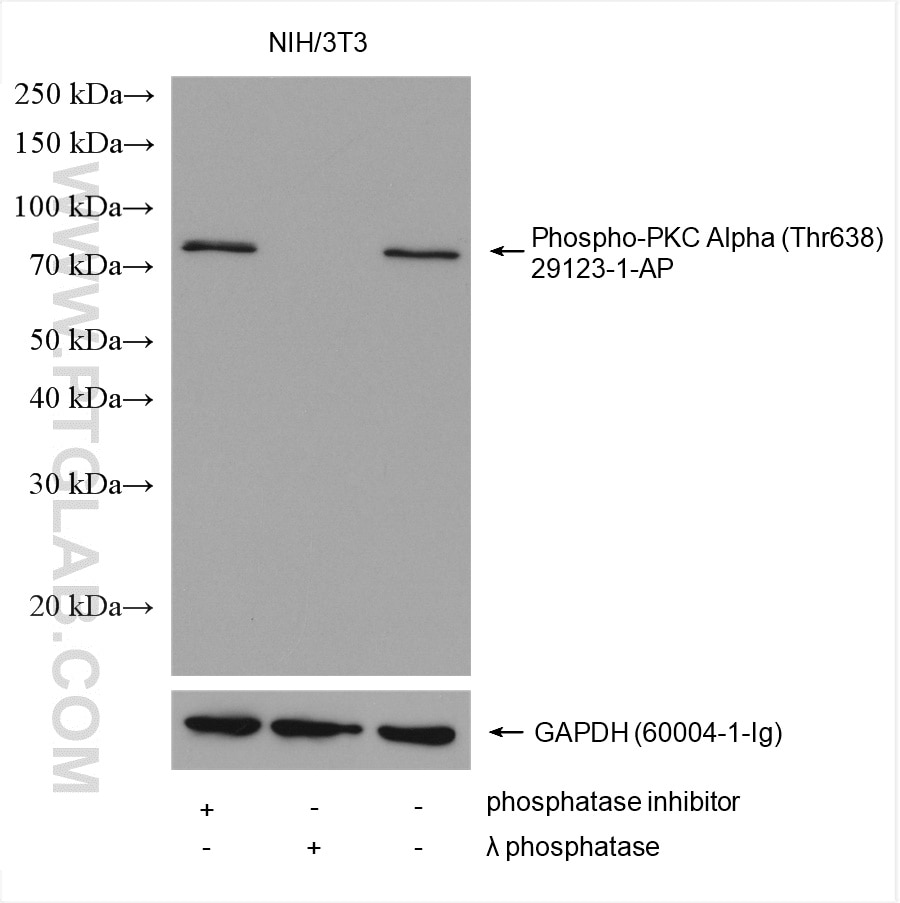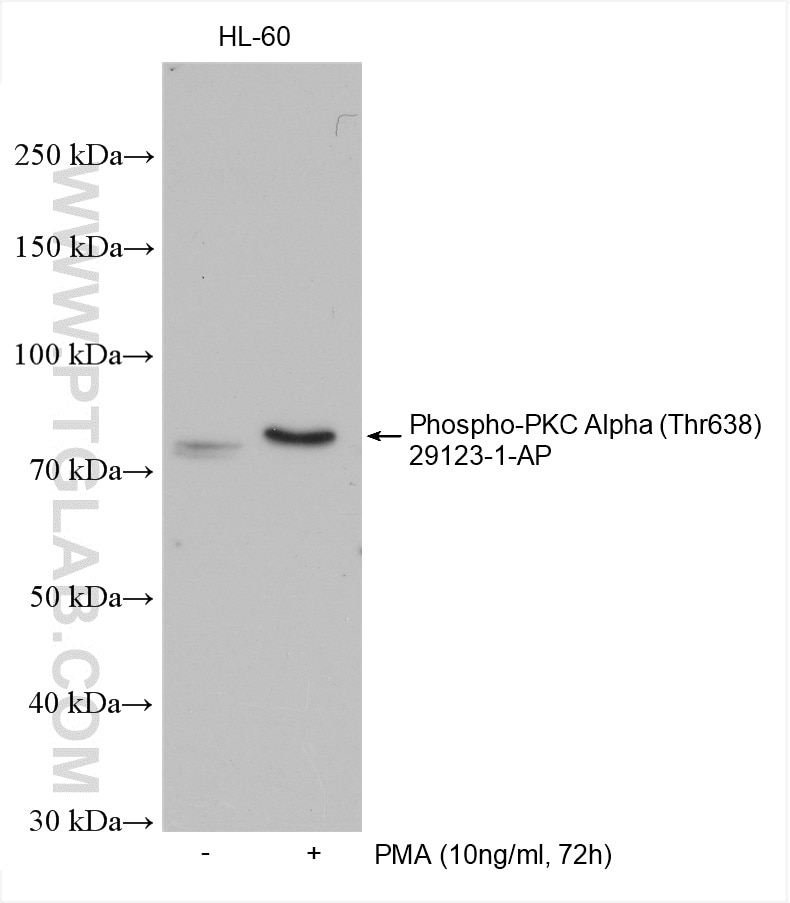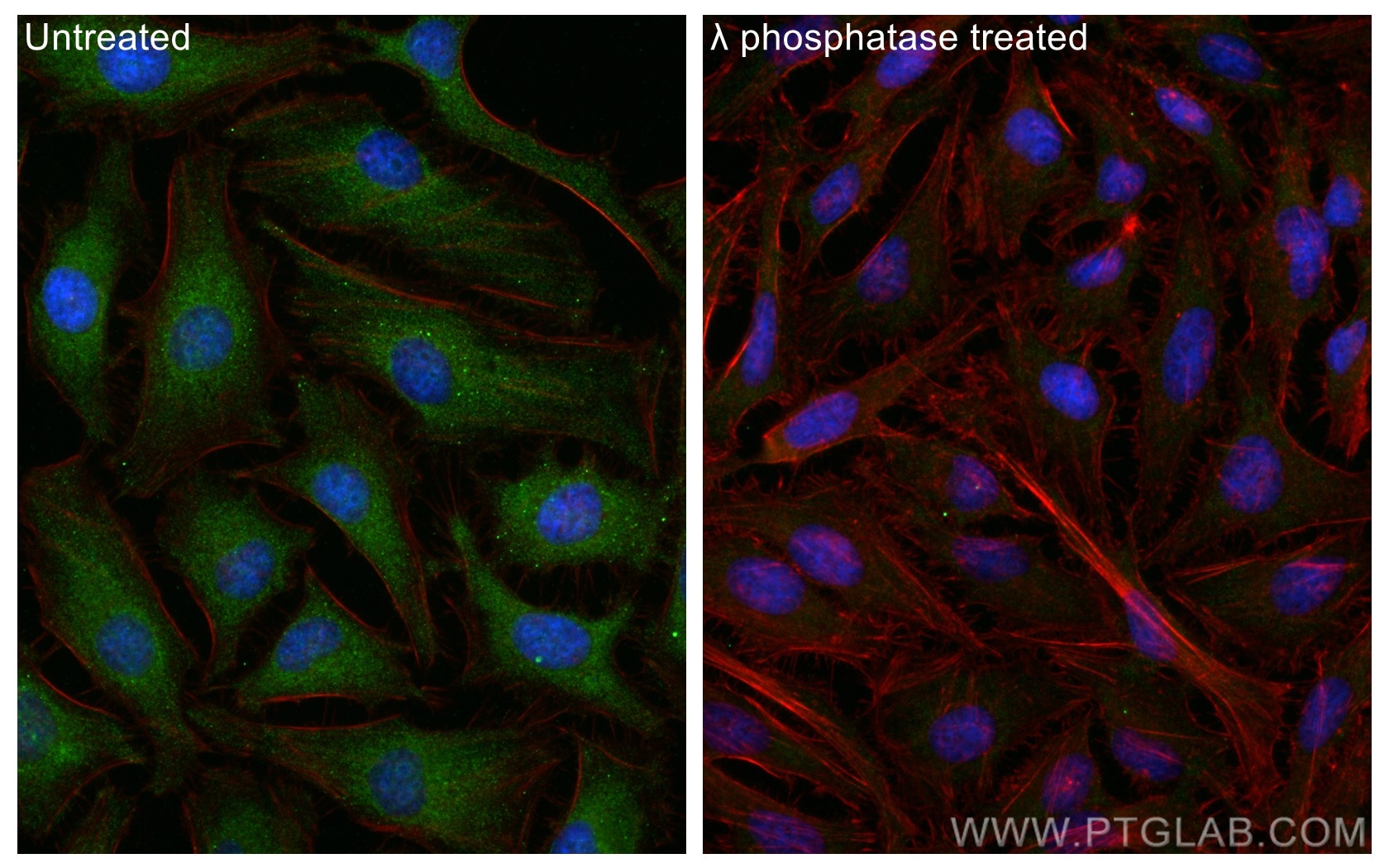Tested Applications
| Positive WB detected in | λ phosphatase treated NIH/3T3 cells, PMA treated HL-60 cells |
| Positive IF/ICC detected in | λ phosphatase treated HeLa cells |
Recommended dilution
| Application | Dilution |
|---|---|
| Western Blot (WB) | WB : 1:2000-1:10000 |
| Immunofluorescence (IF)/ICC | IF/ICC : 1:200-1:800 |
| It is recommended that this reagent should be titrated in each testing system to obtain optimal results. | |
| Sample-dependent, Check data in validation data gallery. | |
Published Applications
| WB | See 6 publications below |
Product Information
29123-1-AP targets Phospho-PKC Alpha (Thr638) in WB, IF/ICC, ELISA applications and shows reactivity with human, mouse samples.
| Tested Reactivity | human, mouse |
| Cited Reactivity | human, mouse |
| Host / Isotype | Rabbit / IgG |
| Class | Polyclonal |
| Type | Antibody |
| Immunogen |
Peptide Predict reactive species |
| Full Name | protein kinase C, alpha |
| Calculated Molecular Weight | 77 kDa |
| Observed Molecular Weight | 77 kDa |
| GenBank Accession Number | AK055431 |
| Gene Symbol | PKC Alpha |
| Gene ID (NCBI) | 5578 |
| RRID | AB_2918239 |
| Conjugate | Unconjugated |
| Form | Liquid |
| Purification Method | Antigen affinity purification |
| UNIPROT ID | P17252 |
| Storage Buffer | PBS with 0.02% sodium azide and 50% glycerol, pH 7.3. |
| Storage Conditions | Store at -20°C. Stable for one year after shipment. Aliquoting is unnecessary for -20oC storage. 20ul sizes contain 0.1% BSA. |
Background Information
PKCs are a family of serine/threonine kinases involved in various processes in cells including proliferation, differentiation, cell survival, and apoptosis. PKC family is composed of three different subgroups: conventional (cPKC), the novel (nPKC) and atypical (aPKC). PKCα, β1, β2, and γ belong to cPKC, PKCδ, ε, η and θ are nPKC, whereas aPKC comprises of PKCζ and λ/ι. All PKCs consist of the N-terminal regulatory region and C-terminal catalytic region (kinase domain). PKCs are physiologically activated by various extracellular signals transduced by hormones, growth factors, cytokines or antigens. The presence of activated PKCs on internal membranes leads to the phosphorylation of various interacting proteins. (PMID: 32466765, PMID: 12417016)
Protocols
| Product Specific Protocols | |
|---|---|
| IF protocol for Phospho-PKC Alpha (Thr638) antibody 29123-1-AP | Download protocol |
| WB protocol for Phospho-PKC Alpha (Thr638) antibody 29123-1-AP | Download protocol |
| Standard Protocols | |
|---|---|
| Click here to view our Standard Protocols |
Publications
| Species | Application | Title |
|---|---|---|
Chem Biol Interact Lead-induced cardiomyocytes apoptosis by inhibiting gap junction intercellular communication via modulating the PKCα/Cx43 signaling pathway | ||
Cancer Med MAPK4 predicts poor prognosis and facilitates the proliferation and migration of glioma through the AKT/mTOR pathway | ||
J Leukoc Biol Transient receptor potential vanilloid 4 (TRPV4) in neutrophils enhances myocardial ischemia/reperfusion injury | ||
Cell Rep Med Cholinergic signaling via muscarinic M1 receptor confers resistance to docetaxel in prostate cancer | ||
Cytotechnology β-sitosterol in Yijing Hugui decoction prevents cyclophosphamide-induced premature ovarian insufficiency via the AKT1/Nrf2 pathway | ||
Int J Mol Sci Oryza sativa L. Indica Seed Coat Ameliorated Concanavalin A-Induced Acute Hepatitis in Mice via MDM2/p53 and PKCα/MAPK1 Signaling Pathways |
Reviews
The reviews below have been submitted by verified Proteintech customers who received an incentive for providing their feedback.
FH Gaurav (Verified Customer) (12-05-2025) | Good antibody working on room temperature
|








